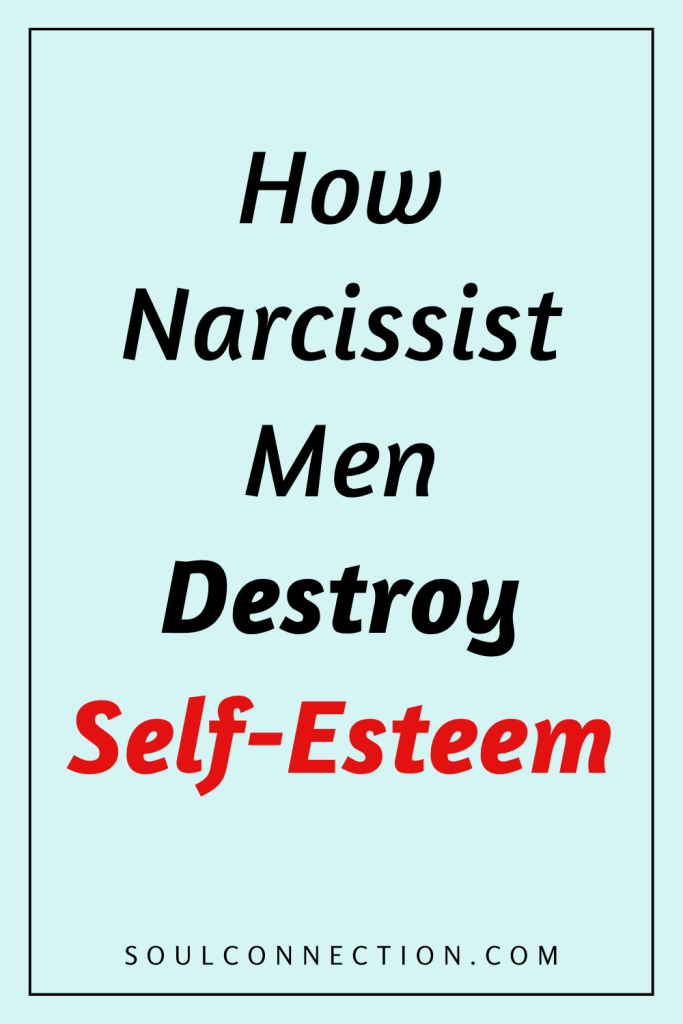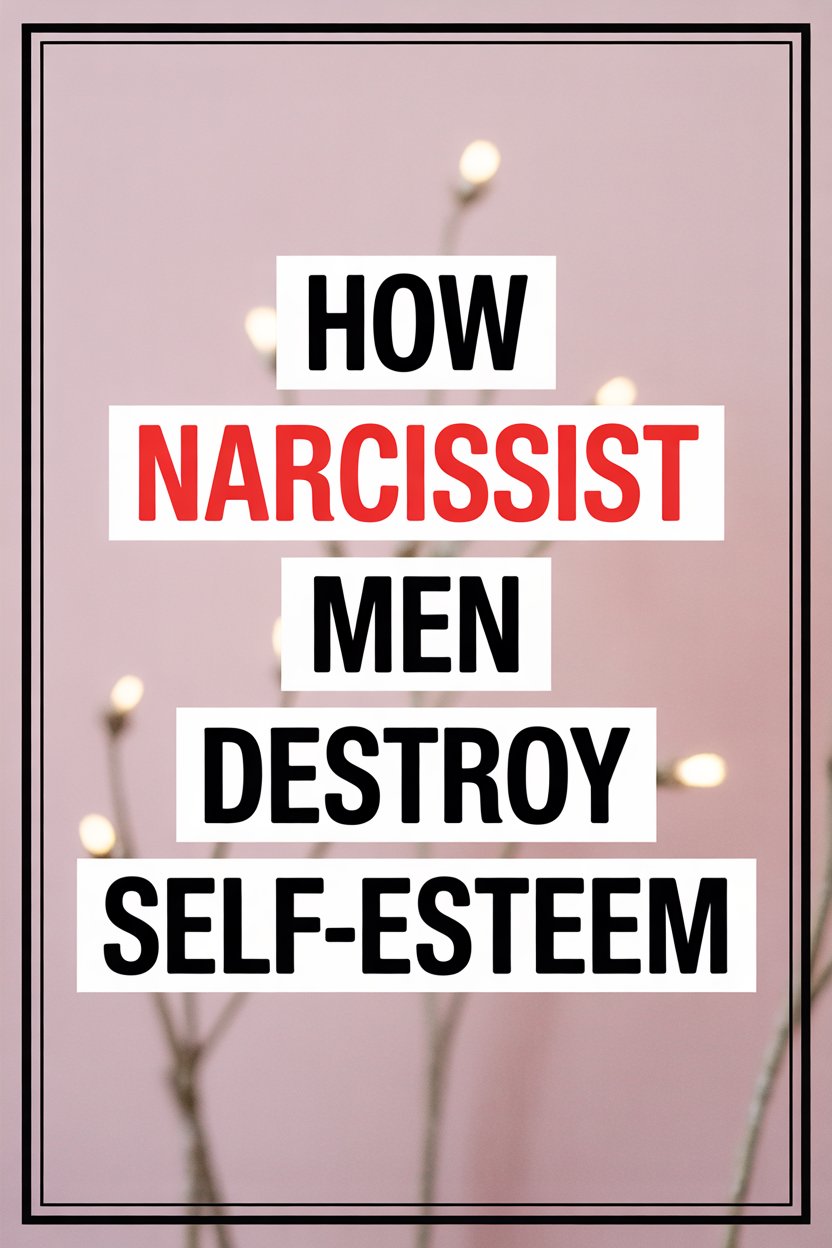Some men come bearing flowers. Others come bearing—you guessed it—red flags on shiny silver platters.
If you’ve ever felt your self-worth quietly eroding when you’re with a certain someone, you might have tangled with a narcissist. No, it’s not just a buzzword tossed around at brunch.
When a narcissistic man settles into your life, he can turn self-esteem into a distant memory, like your high school haircut: gone, questionable, and not particularly missed.
Grab a cuppa, sit tight, and let’s shine a light where the gaslighters don’t want it.
The Subtle Art of Emotional Erosion
Narcissists aren’t always the cartoon villains cackling in their lairs. Most start out as charming, attentive, even intoxicating. It’s their signature move, like a magician’s sleight of hand.
One minute, you’re the center of their world; the next, you’re wondering why you can’t do anything right. This isn’t an accident. It’s a calculated campaign to keep you second-guessing yourself so they can stay in control.
It starts with small criticisms, delivered casually—“Are you really wearing that?”—and builds to larger-scale takedowns. Over time, compliments become extinct, replaced by a relentless stream of disapproval.
The result? Confidence takes a nosedive, and you start believing their script.
Gaslighting Olympic Gold
Ever tried to argue with a narcissist? It’s like playing chess with a pigeon. They’ll knock over all the pieces, poop on the board, and then strut around like they won.
Gaslighting is their favorite sport. They’ll insist events happened differently, or that you’re too sensitive (the classic). Before you know it, you’re apologizing for things you didn’t do, convinced you’re losing your grip on reality.
This is psychological warfare with a smile. It’s destabilizing, and it’s not your fault if you start to doubt your own memory. That’s exactly what they want.
The more you question yourself, the easier it is for them to control the narrative—and you.
Withholding Approval and Affection
Approval from a narcissist is like British sunshine—fleeting, unpredictable, and gone when needed most.
Praise and affection, once lavished upon you, are withdrawn exactly when you crave reassurance. This isn’t forgetfulness; it’s punishment.
The message? You have to earn their love, and no matter how hard you try, you’ll never be quite enough.
It’s a powerful lesson, and a damaging one. When love becomes conditional, self-esteem becomes tied to their moods. A harsh look or a cold shoulder is all it takes to send your confidence into hiding.
Turning Flaws Into Weapons
Everyone has quirks. A narcissist will sniff yours out and weaponize them by the second date.
Suddenly, your laugh is “so embarrassing,” your dreams are “delusional,” and your friends? “Well, they’re jealous of us, obviously.” Criticism isn’t offered to help you grow; it’s ammunition to keep you off-balance.
Over time, this barrage of negativity doesn’t just sting—it shapes how you see yourself.
You start to believe you’re lucky to have him, flaws and all, because who else would put up with you? (Spoiler: literally millions would appreciate you, quirks included.)
Isolation: The Not-So-Fun House Arrest
Narcissistic men love an audience—preferably a captive one. One of their oldest tricks is quietly but systematically isolating you from friends and family.
It starts with subtle digs about your loved ones (“Your sister’s a bit much, isn’t she?”), scheduling conflicts that “accidentally” overlap with your plans, or melodramatic sulks if you dare to see other people.
Before you know it, you’re on an emotional island, with only them for company.
The fewer people around to offer perspective, the easier it is to control what you think about yourself. If nobody’s there to remind you how brilliant you are, their voice becomes the only one you hear.
Shifting Blame With the Precision of a Ninja
Ever find yourself apologizing for something he did? Maybe he lost his temper, but somehow it’s because you “provoked” him by asking a perfectly reasonable question—like, “Where were you last night?”
Narcissists are masters of blame-shifting. Accountability? Never heard of her. If there’s a problem, it must be your fault. Their mistakes, their bad moods, their forgotten birthdays—all laid at your feet.
Absorbing this blame chips away at your confidence. If you’re always at fault, maybe you really are the problem, right? Wrong. But believing their version of events is how self-esteem gets bulldozed.
The “Hot and Cold” Routine
Just when you think you’re out, they pull you back in—with grand gestures, sweeping apologies, or a passionate declaration of love straight from a romcom script.
This emotional whiplash is designed to keep you hooked. The highs are so high—who wouldn’t want to stay for the encore? But the lows are brutal, and they always come back around.
This push-pull dynamic floods your brain with stress hormones, turning you into an expert at walking on eggshells. Confidence doesn’t stand a chance amid all that uncertainty.
Trivializing Your Achievements
Excited about something you did? Expect a narcissist to rain on your parade, then claim they’ve never heard of umbrellas.
Accomplishments, big or small, are met with indifference, sarcasm, or outright envy. “Anyone could do that,” they’ll say, or perhaps, “I guess that’s good for you.”
Never mind that you ran a marathon or got that promotion; it won’t be good enough to dent their armor of self-importance.
Over time, you stop sharing your successes. Why invite another eye roll?
This shrinking of your world is bad news for self-esteem, because it teaches you that your wins aren’t worth celebrating—unless, of course, they can take credit for them.
Undermining Your Reality
It’s not enough for a narcissist to attack your confidence—they also want to rewrite your entire reality.
They’ll dismiss your feelings, question your perceptions, and label your valid reactions as “overreactions.” Mention feeling hurt, and you’ll be told you’re being dramatic. Catch them in a lie, and suddenly, you’re “paranoid.”
It’s all designed to keep you guessing, doubting yourself, and relying on them to tell you what’s real. Self-esteem withers in this alternate universe, where your own thoughts and feelings are never trusted.
Using Love As a Bargaining Chip
Narcissists don’t do unconditional anything. Their version of love comes with a price tag and a bunch of fine print.
You might hear, “If you really loved me, you’d do X,” or, “Maybe I could be nicer if you’d just change.” This isn’t love—it’s blackmail. Their affection is always conditional, a reward for obedience.
Nothing erodes self-worth faster than feeling like you have to perform for scraps of affection. Real love doesn’t require a contract, and certainly not one written in disappearing ink.
Your Worth Doesn’t Expire
If you’ve spent time with a narcissistic man, you might feel like your self-esteem has gone through the wash—on hot, with bleach, and then left to dry on a thorn bush.
Here’s the thing: broken confidence isn’t permanent.
The version of you that existed before the manipulation, the doubt, the endless apologies—that person is still there, rolling their eyes in the background, waiting to re-emerge.
Rebuilding self-worth after narcissistic abuse takes time, patience, and often a fresh batch of boundaries. Start by reconnecting with old friends, journaling your truth, or seeing a therapist who specializes in this brand of emotional sabotage.
Celebrate your wins—loudly, with confetti if you must. The more you reclaim your voice, the less power he has to rewrite your story.
One final reminder (said with love and a wink): If someone needs to destroy your confidence to feel good about themselves, they’re not a prize—they’re a cautionary tale.
Here’s to finding partners who build you up, not tear you down. Your self-esteem deserves nothing less.


